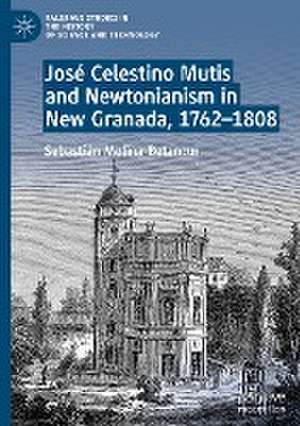José Celestino Mutis and Newtonianism in New Granada, 1762–1808: Palgrave Studies in the History of Science and Technology
Autor Sebastián Molina-Betancuren Limba Engleză Hardback – 18 iun 2023
Din seria Palgrave Studies in the History of Science and Technology
-
 Preț: 352.16 lei
Preț: 352.16 lei -
 Preț: 223.88 lei
Preț: 223.88 lei -
 Preț: 491.21 lei
Preț: 491.21 lei - 18%
 Preț: 783.81 lei
Preț: 783.81 lei - 15%
 Preț: 645.93 lei
Preț: 645.93 lei - 18%
 Preț: 734.09 lei
Preț: 734.09 lei - 15%
 Preț: 698.94 lei
Preț: 698.94 lei - 15%
 Preț: 640.37 lei
Preț: 640.37 lei - 15%
 Preț: 695.01 lei
Preț: 695.01 lei -
 Preț: 385.25 lei
Preț: 385.25 lei -
 Preț: 323.28 lei
Preț: 323.28 lei -
 Preț: 332.33 lei
Preț: 332.33 lei -
 Preț: 389.11 lei
Preț: 389.11 lei - 18%
 Preț: 786.98 lei
Preț: 786.98 lei -
 Preț: 383.93 lei
Preț: 383.93 lei - 18%
 Preț: 772.30 lei
Preț: 772.30 lei - 18%
 Preț: 948.16 lei
Preț: 948.16 lei - 18%
 Preț: 795.83 lei
Preț: 795.83 lei - 18%
 Preț: 732.52 lei
Preț: 732.52 lei -
 Preț: 383.93 lei
Preț: 383.93 lei -
 Preț: 418.07 lei
Preț: 418.07 lei - 18%
 Preț: 731.91 lei
Preț: 731.91 lei - 18%
 Preț: 727.18 lei
Preț: 727.18 lei -
 Preț: 391.02 lei
Preț: 391.02 lei - 18%
 Preț: 729.68 lei
Preț: 729.68 lei -
 Preț: 398.35 lei
Preț: 398.35 lei - 15%
 Preț: 645.79 lei
Preț: 645.79 lei -
 Preț: 420.97 lei
Preț: 420.97 lei - 15%
 Preț: 582.80 lei
Preț: 582.80 lei -
 Preț: 213.58 lei
Preț: 213.58 lei - 18%
 Preț: 785.11 lei
Preț: 785.11 lei -
 Preț: 385.84 lei
Preț: 385.84 lei -
 Preț: 388.52 lei
Preț: 388.52 lei -
 Preț: 417.68 lei
Preț: 417.68 lei -
 Preț: 385.84 lei
Preț: 385.84 lei
Preț: 890.23 lei
Preț vechi: 1085.65 lei
-18% Nou
Puncte Express: 1335
Preț estimativ în valută:
170.37€ • 177.21$ • 140.65£
170.37€ • 177.21$ • 140.65£
Carte tipărită la comandă
Livrare economică 14-28 aprilie
Preluare comenzi: 021 569.72.76
Specificații
ISBN-13: 9783031287671
ISBN-10: 3031287673
Pagini: 212
Ilustrații: XI, 212 p. 7 illus., 6 illus. in color.
Dimensiuni: 148 x 210 mm
Greutate: 0.42 kg
Ediția:2023
Editura: Springer International Publishing
Colecția Palgrave Macmillan
Seria Palgrave Studies in the History of Science and Technology
Locul publicării:Cham, Switzerland
ISBN-10: 3031287673
Pagini: 212
Ilustrații: XI, 212 p. 7 illus., 6 illus. in color.
Dimensiuni: 148 x 210 mm
Greutate: 0.42 kg
Ediția:2023
Editura: Springer International Publishing
Colecția Palgrave Macmillan
Seria Palgrave Studies in the History of Science and Technology
Locul publicării:Cham, Switzerland
Cuprins
Chapter I. The administrative history of a chair.- Chapter II. Newtonianism in Mutis’s lectures on mathematics.- Chapter III. Newton’s physics in New Granada: Mutis’s lectures and mathematisation of nature.- Chapter IV. The circulation of Newtonianism in New Granada after Mutis’s lectures.
Notă biografică
Sebastián Molina-Betancur is Postdoctoral Research Fellow at the Università degli Studi di Milano (Italy) where he studies the circulation of science in the Spanish colonies between the sixteenth and the eighteenth centuries. He has been lecturer of history of science and history of philosophy at the Universidad de Antioquia (Colombia).
Textul de pe ultima copertă
Basing his monograph on newly discovered documents, Molina-Betancur compels us to appreciate the plurality of meanings that the term ‘Newtonianism’ could take. He achieves this by looking at the reception of Newton’s ideas from the vantage point of the Viceroyalty of New Granada, rather than from a European perspective. This book not only sheds new light upon Celestino Mutis’s intellectual world, but it is also an eye-opening contribution on rather broad issues concerning the relationships between science and empire.
Niccolò Guicciardini, University of Milan, Italy
This book presents the process of circulation and adoption of Newtonianism in the Viceroyalty of New Granada (modern-day Colombia) in the eighteenth century by examining José Celestino Mutis’s lectures at the Colegio del Rosario between the 1760s and 1770s. Mostly famous for his botanical activities as director of the botanical expedition, Mutis lectured the first course of mathematics ever created in New Granada on his arrival in Bogota in 1762, in which he included several lectures on physics that encompassed multiple aspects of his interpretation of Newton’s experimental physics.Sebastián Molina-Betancur is Postdoctoral Research Fellow at the Università degli Studi di Milano (Italy) where he studies the circulation of science in the Spanish colonies between the sixteenth and the eighteenth centuries. He has been lecturer of history of science and history of philosophy at the Universidad de Antioquia (Colombia).Niccolò Guicciardini, University of Milan, Italy
Caracteristici
Depicts how Newtonianism informed the development of the Spanish colonies in the New World Presents unprecedented textual evidence to characterise the circulation of science in the Americas Examines the earliest translations into Spanish of Newton’s, Descartes’s, Wolff’s, and Gravesande’s works
